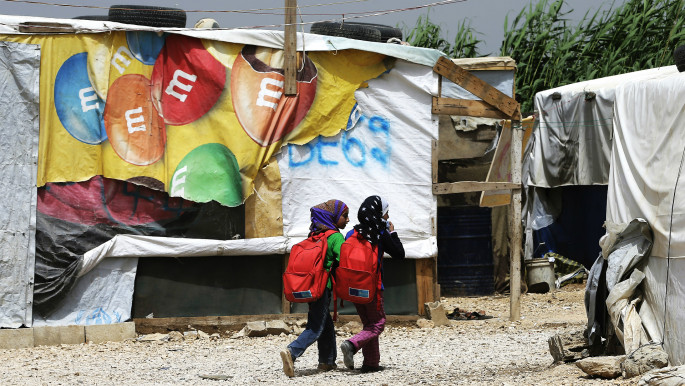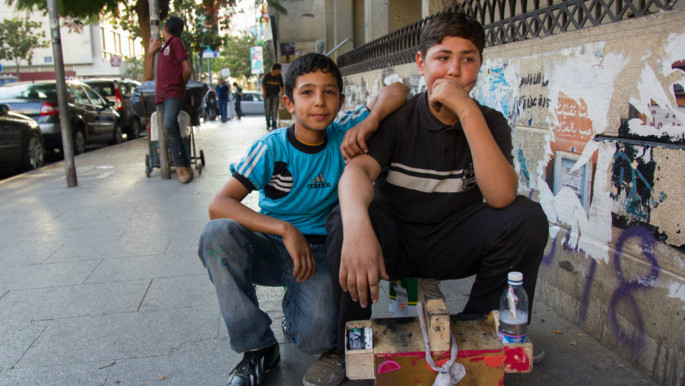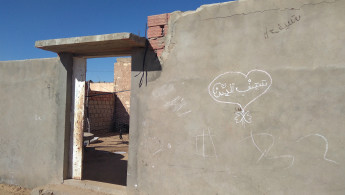Paying a price for their future with their own lives: Tunisia's troubling child suicide rates
Driving through Souk Jedid, a rural area in the Sidi Bouzid governorate, in the centre of Tunisia, the remoteness and state of abandon give a stark picture of what everyday life is like for the communities in the hamlet.
Souk Jedid suffers from a high illiteracy rate and rampant unemployment of up to 50 percent. It has poor access to health services and no public transportation forcing villagers to walk long distances to reach the nearest pick-up point where shared microbuses stop along the route.
Last month, the body of nine-year-old boy, Seif Ghenimi, was found hung behind El-Zafzaf primary school in the village.
A man named Abdelhamid Karmi showed up on a pathway that intersects the court of the school. He was the first to find the boy a few metres away from the footpath he regularly takes to go from and to his home.
"That day he was hyperactive, running around and going up on an olive tree," the villager says, as he recalls the moments that preceded the tragedy. "I thought he was preparing some game. But later when I returned, I saw him hanging there."
 |
|
| Read also: A right to education: Saving Syrian refugee children from becoming a lost generation |
Mohsen Ghenimi, the child's father, said it was one of his daughters who discovered the corpse half an hour after Seif was back to school for the afternoon session.
He pointed to a heart with the name "Seifeddine" inside drawn on a wall outside his family house, a symbolic homage paid by some neighbours.
"Seif always felt a sense of deficiency. A lot of things were missing for him," the father said, as he sighed and looked down. "He was constantly feeling poor and neglected."
Mohsen remembered his son comparing himself to his classmates all the time, and asking for good clothes, a pair of shoes and a new schoolbag.
Read also: Lesbos migrant camp suffering mental health crisis as children say they 'want to die'
"I didn't have the money to satisfy his basic needs," he admitted with bitterness. "I have six sons and daughters and a disabled wife. I work in the fields irregularly and barely make 200TD (£54) a month.
The day of the desperate act, the little boy had flip-flops on his feet and no coat to wear, despite the winter cold.
Mohsen led the way to his home to show the spartan conditions in which his family of eight lives in, sharing the same room to both sleep and cook and using a separate room for storage.
Back in the school's garden, Karmi lamented the severe marginalisation of the Souk Jedid area holding the state responsible for it, while alluding that socio-economic deprivation could be one of the reasons behind these child suicides.
"There are no development support programmes in this region, the state doesn't do its job of combating poverty," he uttered. "We only have God to ask for help."
 |
The state does not fulfil its duty in tacking regional disparity and underdevelopment, on one hand, and no psychological support is made available for kids and adolescents, on the other |  |
The man who lives nearby the primary school mentioned that, except for the school premises, there is no provision of water supply in the surrounding area which means residents have to travel 15km to buy water tanks costing 45TD (£12) each.
The feeling of exclusion among the most disadvantaged social strata is particularly felt among the young people living in remote neighbourhoods, who are left with hardly any ambitions or dreams for their future lives.
Abdessalem, a citizen of Sidi Bouzid, maintained that the state does not fulfil its duty in tacking regional disparity and underdevelopment, on one hand, and no psychological support is made available for kids and adolescents, on the other.
"Suicide becomes a solution for these children wanting to get out of such an environment," he said.
But Seif's case is not an isolated one. He is the third child who has ended their life in Souk Jedid in less than four years.
The village was the scene of a previous suicide crime in October that involved Rayen Jabli, 11, another child who also attended El-Zafzaf school.
Read also: Activists blame racism for tragic suicide of Syrian child in Turkey
Fattoum, his mother, speaks about how things went on the day.
Standing in the home garden, carrying a small child in her arms, she repeatedly said that her boy was in good mental health and had no problems either at school or in the family. She blamed the school director and three teachers for using violence against Rayen leading to his fatal gesture.
"He was a bright child, the second best in his class. He was beaten and thrown out of school two hours before finish time for playing with three unruly classmates," Fattoum recounted angrily.
"The principal had my phone number and that of my husband, but didn't call to alert us," she underlined with resentment. "He and the school teachers did what they did, they're responsible for how it all ended up."
 |
Chilling reports of Tunisian children resorting to suicide in different parts of the country have circulated in the past years |  |
After waiting for the son's return, and learning from some children what had happened at school, the parents made several calls in the neighbourhood and went around looking for him. They found him later in the afternoon, hanging from a tree in the garden further away from the house.
Also in Souk Jedid, a college girl aged 16 was found suspended from a tree next to her family home in a rural neighbourhood in December. The cause to her death still remains unknown.
 |
|
| Read also: The plight of Lebanon's working street children |
Chilling reports of Tunisian children resorting to suicide in different parts of the country have circulated in the past years.
Last month's report by the Tunisian Social Observatory (OST) showed that rates of suicides and attempted suicides since January last year have remained unchanged, with 25 cases recorded.
However the number of incidents related to children has gone from three to five (below the age of 15). Eleven governorates saw suicide cases taking place in January this year, from north to the centre and south. OST collects suicide figures month by month from media reports or direct information from relatives.
Forty three cases of child suicides were documented in the 2019 report by the Tunisian Forum of Economic and Social Rights (FTDES).
Largely under-reported, the phenomenon of suicidal acts among Tunisian children raises serious questions as to what may drive a child to commit suicide.
While there appears to be a correlation between the socio-economic level and suicidal behaviour, the matter is not strictly related to poverty since it does not affect disadvantaged social classes only, and is not exclusive to marginalised areas.
 |
Kids are paying a price for their future, sometimes with their own lives |  |
Other issues associated with suicidal behaviour come from a dysfunction within the family, school or social environment. The poor quality of family situation, physical abuse, school violence and peer bullying can lead young people to suicidal attempts.
Mental disorders including depression, anxiety, low self-esteem and bipolar disorder are also determining factors.
Smoking, alcohol consumption, and misuse of other substances are likewise correlated with suicidal risk in youth.
Several voices in the civil society say the state, above all, has the responsibility of relieving the pain of the population.
"This is about fundamental rights: the right to live in dignity, the right to education, the right to work. All of this is being called into question," OST coordinator Najla Arfa told Qantara.de in December.
The Tunisian Parents and Students association (ATUPE) warned against the rise in child suicides in a press release issued last month, pointing out that the state is responsible for such phenomenon "since it still doesn't size the gravity of the situation of the education sector".
Referring to the latest child suicide in Souk Jedid, the organisation said all actors concerned in the educational milieu should bear responsibility for delivering a service that does not meet the needs of school pupils and "harms their dignity" leading to an increase in violence.
ATUP's head Ridha Zahrouni reiterated that the state which should act as a guarantor is to be blamed for today's dysfunctional system and "not hopeful" educational conjuncture that is "conducive to violence".
He believes that the child finds themself in the middle – between parents, school directorate and teaching staff – at the mercy of their disaffection with the current system.
"Kids are paying a price for their future, sometimes with their own lives," Zahrouni voiced.
"We are building a society that is more and more violent, marginalised and shifted from our core values in real life."
Alessandra Bajec is a freelance journalist currently based in Tunis.
Follow her on Twitter: @AlessandraBajec



